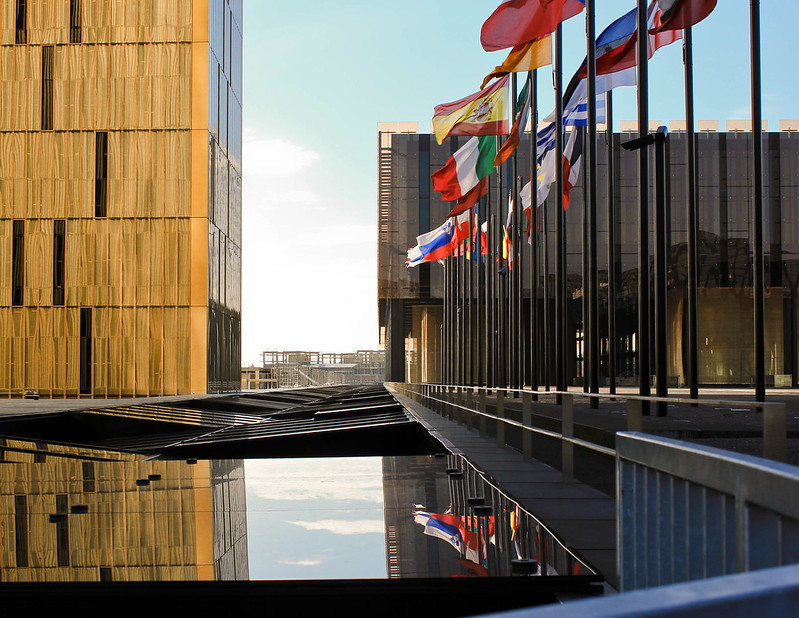The CJEU Facebook Ruling: How Bad Is It, Really?
It’s been a busy two weeks for the Court of Justice of the European Union (CJEU). Last week, the court handed down a landmark decision in favor of Google; this Thursday, Oct. 3, it released a blockbuster ruling against Facebook.

Published by The Lawfare Institute
in Cooperation With

It’s been a busy two weeks for the Court of Justice of the European Union (CJEU). Last week, the court handed down a landmark decision in favor of Google; this Thursday, Oct. 3, it released a blockbuster ruling against Facebook.
In last week’s case, Google v. CNIL, the court ruled that France’s order demanding that Google remove certain offending search results worldwide was impermissible, at least as initially conceived. Some observers lauded the decision as an important move pushing back on government regulation of online speech. But, as I said just two days ago: “[T]he court left the door wide open—even put out a welcome mat—for future extraterritorial regulations of the internet.” This week, the court walked straight through that door.
This Thursday, the court decided a case that pitted Facebook against Eva Glawischnig-Piesczek, an Austrian politician who sought Facebook’s help in removing disparaging public posts by a Facebook user (one post called Glawischnig-Piesczek a “corrupt oaf”). Facebook declined to remove the offending posts, and the Vienna Commercial Court issued an injunction against the firm, requiring removal of not only the offending post but also “identical” and “equivalent” posts. Facebook complied by removing only the original post for users located in Austria. After much wrangling in the intermediary court about whether Facebook needed to proactively monitor and take down similar posts, both parties appealed to the Austrian Supreme Court for clarification and that court asked the CJEU to weigh in. It finally has.
The court held that Article 15 of the EU’s e-commerce directive does not prohibit EU states from ordering extremely broad injunctions against platforms like Facebook to take down offending material (and therefore allows it). The court held that these injunctions can cover a wide array of material—not just Facebook posts but also reposts and “equivalent” posts—and apply worldwide.
Both aspects of the decision have people pulling their hair out. The first holding—that injunctions can hold intermediaries responsible for offensive material and their “equivalent”—is tricky because it appears to be a classic court-mandated injunction that does not take into account the burden of compliance on the operator. It may be manageable for platforms to automatically police tweets and retweets. But asking Twitter or Facebook to take down “equivalent” content will be messy; it will require the human and automated moderators at the firm to make judgment calls, and inevitably the firm will take down some nonoffending valuable speech. (If calling someone a corrupt oaf is impermissible, would it be okay to call him or her an ineffective doofus? Or a litigious ninny? Reasonable minds might disagree.) Daphne Keller has a helpful white paper about the costs of using filters for the purpose of taking down wide swaths of content. Keller called Thursday’s ruling a “worst case scenario.”
But it is not obvious to me why the harms of losing some valid speech outweigh the harms of allowing some illegal speech—unless you are a free speech absolutist. This is an Austrian case applying European rules, and sensibilities about regulating speech are different in Europe than they are in the U.S. It does not strike me as necessarily wrong for Austria to decide how much speech to tolerate, even if that means controversial or political speech receives much, much less protection than it would in the U.S.
None of this would matter nearly so much if it weren’t for the second big aspect of the ruling: its global reach. The second major holding is that states may command firms like Facebook “to remove information covered by the injunction or to block access to that information worldwide” (emphasis added). This ruling is not a surprise. As Jennifer Daskal pointed out about last week’s case, “[T]he court’s analysis [in Google v. CNIL] basically dictates the result” in today’s case. But it is a result that many feared. The global nature of the court’s injunction is why, when Jennifer Daskal and Kate Klonick wrote about the case over the summer, they warned that upholding Austria’s order would trigger a global “assault on speech.”
But will it? As I said in “Litigating Data Sovereignty,” and as I keep saying around here, global injunctions are not necessarily so novel or scary if they are issued in a way that takes into account competing sovereign values. So did the CJEU say anything about comity or sovereign deference? The best we can say is “maybe.” All the court said is that global injunctions like Austria’s are limited by “the relevant international law.” What constraints international law might offer is unclear, to say the least; the court could have been referring to any number of international law rules. But one sensible guess is that the court was referring to comity—the normal set of sovereign deference rules that constrain courts in a system of mutual restraint and recognition. Comity does not prohibit global takedowns; to the contrary, it provides for a weighing of relevant sovereign interests, some of which might militate in favor of an extraterritorial order. If the court was referring to comity, that’s good news and should assuage one’s fear of a rogue Austrian judge dictating speech rules for the world.
But suppose that the court did not intend to refer to a balancing of sovereign interests; suppose the case really is the worst-case scenario. How bad would that be? The fear that motivates the anxiety around the Oct. 3 ruling is a global injunction by a really bad actor—some state with the wrong speech values—that might demand the removal of some speech that is illegal in the “bad state” but legal in most of the world. Obviously, such an order would be difficult for the internet firm doing business in that state. But would it be bad in some larger sense? I’m really not so sure.
Let’s game this out. If Austria demands that Facebook take down material with an order that is permissible in Austria but impermissible in the U.S., Facebook will insist that the Austrian court order does not apply to Facebook’s product in the U.S. It will ask for the court’s mercy—and political sensibilities—to avoid a possible conflict of laws. Perhaps the court will listen and accommodate Facebook’s concerns; or perhaps the court will insist that the interests of protecting the offended party in Austria outweigh free speech concerns in the U.S. So what happens next? Most likely, Facebook will seek an order from a U.S. judge clarifying that Austria’s order would never be given effect in the U.S. because it is repugnant to U.S. policy, if not U.S. laws. Facebook will then take this American ruling to Austria to show that the fear of a conflict is not just theoretical. Maybe Facebook will make an attempt at diplomacy and leave the material up in the U.S. but add a note saying that the material has been censored in Austria. This would show the Austrian authorities that Facebook takes their concerns seriously, even while the firm resists complying.
If the prospect of a protracted legal back-and-forth does not persuade the Austrian authorities to back down from the global injunction, Facebook will be faced with a tough choice: comply with the order or not. If it does not comply, it will be testing whether Austria is willing to use the coercive arm of the state to enforce the law—seize assets, arrest employees, shutter the service. And if any of those things happen, Facebook will face an even tougher choice: comply or walk away from the Austrian market. Facebook would make the stakes of the debate clear, and many in Austria would be petitioning the Austrian government to avoid doing something that would be bad for the Austrian economy.
Regardless of the outcome, it would not be the first time that a global tech company has faced such a choice. Nor would it be the first time that a state insists on applying its rules in ways that a tech firm finds incompatible with its global business predicated on a uniform speech platform. This ruling signals that the world is heading toward many more such confrontations, not fewer.
This will strike some observers as terrible. As states get more aggressive about asserting their laws over Western internet companies, something is indeed lost: the cosmopolitan fantasy of a uniform internet. But that was never realistic—nor, for so many outside the U.S., desirable.




